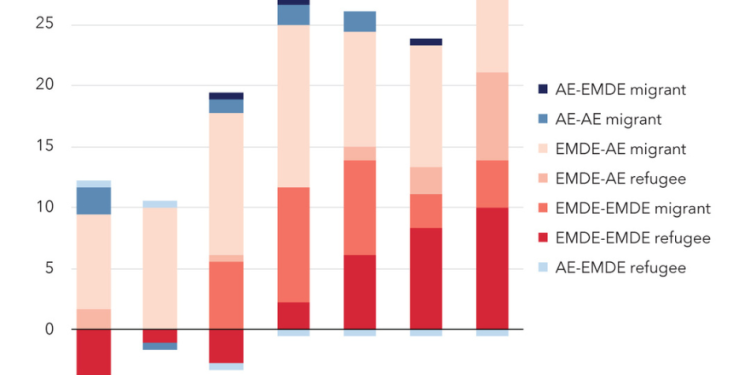Migration and Refugee Policies Steer People, and Economies, in New Directions
Migration has always been an integral part of humanity’s history and success. As of last year, more than 300 million people had legally relocated in search of greater opportunity—as migrants—or to escape conflict or natural disaster—as refugees.
That number has almost doubled since 1995, largely due to the increased flow of refugees between emerging market and developing economies.
While factors that push people from home or pull them elsewhere vary profoundly, policies governing such movement also play a role.
Barriers to legal movements have risen in recent years amid growing skepticism of globalization and challenges to economic growth. In a chapter [link] of the April 2025 World Economic Outlook, we examine how changes to the policies faced by migrants, or refugees, or both, can alter their journeys within and between economies by opening some doors and closing others.
Our work identifies four channels through which restrictions can affect the number and composition of arrivals to receiving economies:
- Destination substitution, whereby stricter policies in the intended destination divert people to other places or leave them stranded in transit.
- Categorical substitution, whereby tighter policies for a specific category—legal migrant or refugee—can lead people to seek another legal pathway into the country.
- Origin suppression, in which stricter policies targeting citizens of specific economies deter inflows from those jurisdictions.
- Origin substitution, whereby people from non-targeted economies are encouraged to fill resulting gaps.
These types of reconfigurations of new arrivals affect labor supply and aggregate demand. Additional inflows can boost economic output and labor productivity, but they can also create short-term challenges by straining local services and infrastructure. Such costs are likely steeper when countries have more challenges integrating newcomers—as is often the case in emerging market and developing economies that receive a greater proportion of refugees and often have limited capacity to absorb sizable inflows.
The costs may also be higher if the skills of migrants and refugees are not well matched with the needs of the local labor market—a more common challenge for refugees, who arrive without a job offer, and may lack necessary language skills, or certified qualifications.
Our results suggest that the spillovers from destination substitution can be significant. Take the example of a set of economies tightening policies to deter 20 percent of migrant and refugee inflows into their economies. In turn, the destination economies receiving these diverted flows experience modest gains in economic output of 0.2 percent, on average, over the same horizon, with more pronounced effects in advanced economies.
At the same time, when an economy implements tighter policies toward legal migrants, that can cause the shift we refer to as categorical substitution, and can be linked to an almost 30 percent increase in the typically smaller inflows of refugees over the subsequent five years. Hosting refugees has muted output effects on average, but the potential for economic gains can be tapped with stronger integration policies—such as naturalization and easier domestic movement—notably among emerging market and developing economies.
Restrictions can have important efficiency implications. While curbing inflows can alleviate the more immediate strains on infrastructure and services, the reduction in labor supply undermines productivity gains and capital accumulation can result in lost long-term economic opportunity.
Meanwhile, economies that become bigger destinations because of diversions from elsewhere face increased short-to-medium term strains, to accommodate a larger population before the longer-term benefits of a larger workforce set in. Therefore, by working together, destination economies can ease individual congestion strains from unexpected inflows, while preserving the longer-term benefits for all.
Changes in migration and refugee policy can also affect the distribution of economic outcomes within countries. In economies that have received migrants or refugees diverted from other destinations, increased competition may reduce wages for some workers, notably in the short term. Meanwhile, incomes can increase for locals engaged in activities complementary to the skills of incoming migrants and refugees.
Migration and refugee policies can’t substitute for actions that sustainably address underlying pull and push factors—particularly those relating to forced displacement—but they can help manage inflows. Countries receiving diverted flows may face immediate short-term congestion pressures, but they can turn the challenge into long-term opportunity by strengthening integration policies, boosting infrastructure investment, and promoting private-sector development. Moreover, international cooperation across economies can help distribute short-term costs more evenly and help produce stronger long-term benefits.











